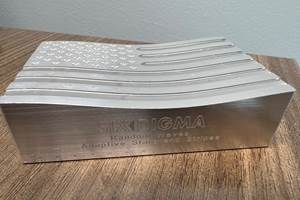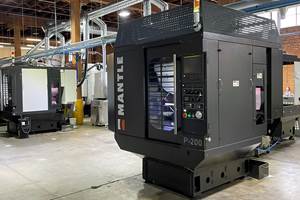The Case for Consistency
Why do manufacturers ask their employees to work within defined systems? Here's why consistency matters.
Share






Every machine shop that advances in success and sophistication eventually has to transition from being a band of craftsmen into operating within a system of defined procedures. The tribe becomes an enterprise. The craftsmanship is still there, but now it is directed toward refining the overall system rather than just making individual parts.
At one shop I visited recently, I was privileged to be present at that transition moment—a moment in which the shop decided to pursue ISO certification. During a crew-wide lunch in which long tables were set up near the shop floor, the shop’s owner and manager overseeing the ISO efforts described the aim of the new system of procedures that would define the shop’s processes. The men described how the defined procedures could (and should) change if they proved problematic, but that following standard procedures would define the shop's culture moving forward. The ISO manager then turned to me, as one who has seen and known a lot of shops, and asked if I would comment on why consistency is important in manufacturing.
What a big question! But what an important question worthy of an answer. What follows is not what I said. What follows is what I would have said had I composed a concise response. The case for systemization, the case for defined procedures in manufacturing, includes the following. Why consistency? Here are the reasons:
Inconsistency Multiplies Cost
Different people performing the same operation in different ways leads to the need for different resources. For example, one machinist may use a tool for a particular job that others do not. Funding different personal preferences produces extra expense.
Inconsistency Gives Error More Opportunity
Every error in manufacturing is the result of a variable that slipped beyond the parameters of control. With fewer variables, error-free manufacturing is easier to maintain. Expanded variables from varying procedures means more can go wrong.
Inconsistency Turns People Into Variables
If team members A and B follow different procedures, then the choice of A or B has an impact on the success of the job. Production shouldn’t be personal.
Inconsistency Makes the Shop a Black Box
Problems have to be diagnosed, with the diagnosis sometimes running upstream through the supply chain. The cause of a poor outcome in a part or assembly can be discovered if every step leading to the outcome is known. If the machine shop has variable procedures, then the path of diagnosis ends at its door. The more critical the part, the more concerning this is.
Inconsistency Clouds the Way to Improvement
The shop that knows its procedures knows what procedures are underperforming and therefore can see precisely what to fix to make its next advance.
Inconsistency Impedes Training
If the way you work is by personal art, then I may or may not be able to learn it. But if the way you work is according to defined steps, I can follow and learn those steps.
What would you add? What benefits has systemization brought to your shop? I'd like to revisit this topic by quoting others on their answer to this same big question. Why consistency? Email me.
Related Content
Manufacturing Technology and Training in Europe
NTMA’s European Tech Tour exposed attendees to the latest technology and traditional training methods used by European manufacturers.
Read MoreHow I Made It: Trevor Hirschi, Instructor, Bridgerland Technical College
Student, operator, instructor, shop owner — Trevor Hirschi’s many roles have enabled him to understand both the technical and creative sides of manufacturing.
Read MoreBuilding Machines and Apprenticeships In-House: 5-Axis Live
Universal machines were the main draw of Grob’s 5-Axis Live — though the company’s apprenticeship and support proved equally impressive.
Read MoreIn Moldmaking, Mantle Process Addresses Lead Time and Talent Pool
A new process delivered through what looks like a standard machining center promises to streamline machining of injection mold cores and cavities and even answer the declining availability of toolmakers.
Read MoreRead Next
How I Made It: Dennis Rymanowski
Dennis Rymanowski has worked at NSH USA for 60 years, with his passion for manufacturing living alongside his passion for his family’s polka band.
Read MoreA New Frontier in Surface Finish Control
What if your machine tool could measure surface roughness as it cuts? This article explores how in-process metrology is advancing from concept to reality, enabling real-time feedback, immediate detection of anomalies and new levels of control over surface quality. Discover the technologies making this possible.
Read More






















